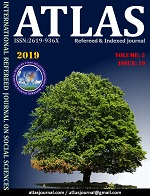FAL WRITING TRADITION AND IN VERSE FALNAME TEXT IN CLASSICAL TURKISH LITERATURE
DOI:
https://doi.org/10.31568/atlas.328Keywords:
Fal, Fâlnâme, Quran, writing, folk beliefsAbstract
The tradition of fortune-telling from the existence of human beings to the present shows how much we have settled in our culture of culture and the importance of it in our culture. People have never stopped looking at the falcon at any time in their lives. For this reason, the phenomenon of life in which our literary works are nourished is included. People strive to implement what they hope in their lives. They apply to get information about the rate at which the request will take place. The purpose for which the examination is required can vary depending on the situation or the circumstances of the period. Based on the comments of fortune-telling; It can be understood how the person expects, sees the purpose of existence in the world and how he perceives and names the beings around him. In classical Turkish literature, there are many works written about fortune-telling tradition. The works written on this subject are called Fâlnâme. These texts, which are considered as a separate species in our literature, give information about the fortune-telling tradition. Some of these artefacts are one of the fortune-telling types of the Quran. The works written in this type are the works that indicate the Quran letters in which events and facts are symbols. In order to base the credibility of Fala on a firm foundation, the beginning of the Qur'an, and the interpretation of the interpretations based on the verses and hadiths, are in contact with the subconscious of individuals. Fâlnâme, which is the basis of the study, is a work of this kind. The text of Fâlnâme, which is the source of our study, was registered at the Atatürk University Library, Seyfettin Özege, writing in the ASL594 Mec. It is located between the leaves 72b-75a. In this study, after the expression of the tradition of writing of Fal-i Qur'an in our classical Turkish literature, a verse of Fâlnâme will be presented with his analysis.
Downloads
Published
How to Cite
Issue
Section
License

This work is licensed under a Creative Commons Attribution-NonCommercial 4.0 International License.


